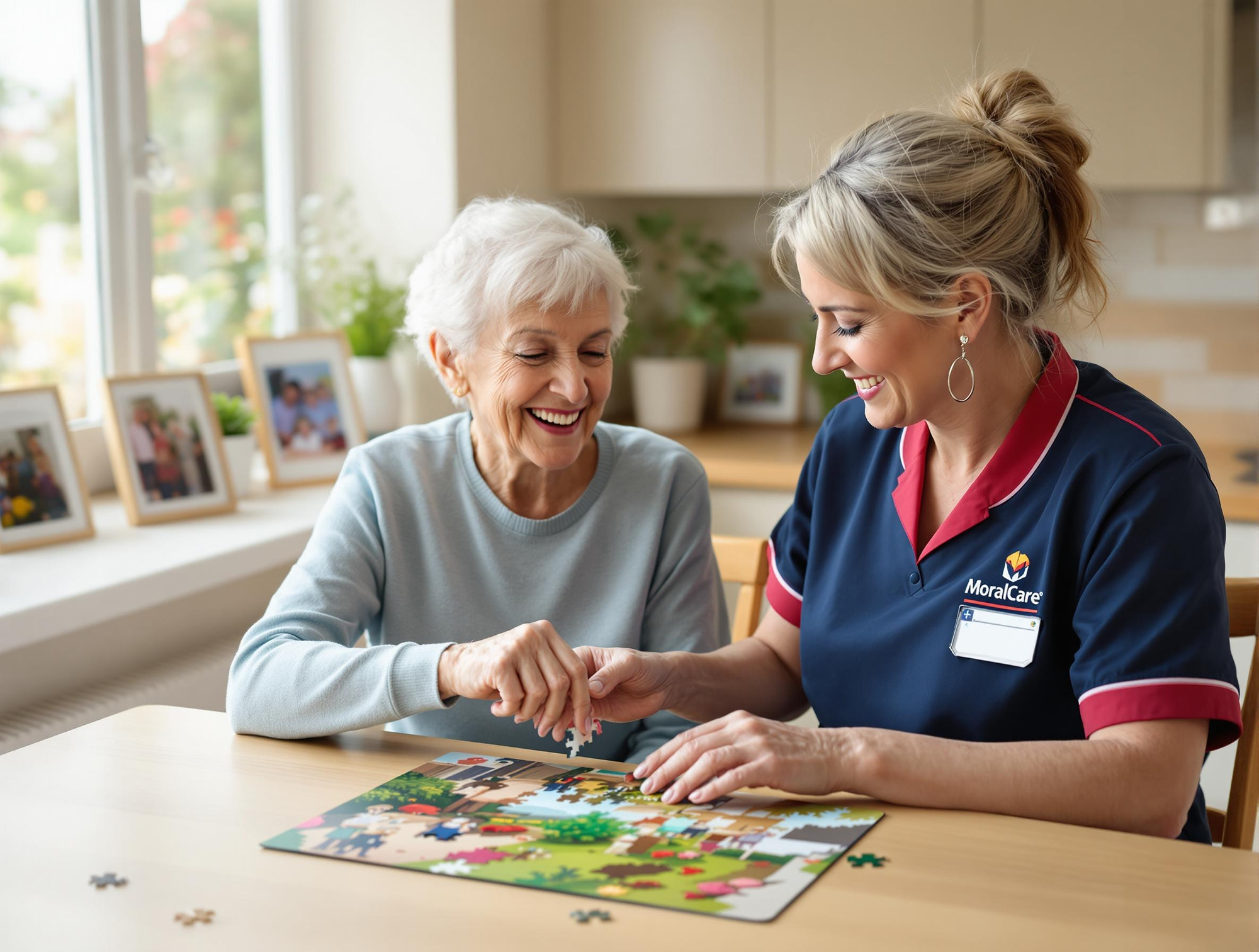Meaningful Activities for People with Dementia: Enhancing Quality of Life at Home

Living with dementia doesn't mean the end of enjoyment, creativity, or meaningful engagement. At MoralCare, we believe that the right activities can bring joy, maintain cognitive function, and preserve dignity for people with dementia whilst providing valuable bonding opportunities with family and carers. Our experienced team regularly engages clients in a variety of stimulating activities that are both enjoyable and beneficial.
Understanding the Importance of Activities in Dementia Care
Activities aren't just about passing time—they're therapeutic interventions that can:
Maintain Cognitive Function:
Stimulate memory and thinking processes
Encourage problem-solving and decision-making
Support language and communication skills
Preserve familiar skills and abilities
Enhance Emotional Wellbeing:
Reduce anxiety and agitation
Boost self-esteem and confidence
Provide sense of purpose and achievement
Create positive emotional experiences
Support Physical Health:
Encourage movement and exercise
Maintain fine and gross motor skills
Improve appetite and sleep patterns
Reduce restlessness and wandering behaviours
Strengthen Social Connections:
Facilitate meaningful interactions with carers and family
Maintain relationships and communication
Reduce feelings of isolation and loneliness
Create shared positive experiences
Choosing the Right Activities: Person-Centred Approach
The key to successful activities lies in understanding the individual's:
Personal History:
Former occupations and skills
Lifelong hobbies and interests
Cultural background and traditions
Personality traits and preferences
Current Abilities:
Physical capabilities and limitations
Cognitive strengths and challenges
Communication preferences
Energy levels throughout the day
Environmental Factors:
Available space and resources
Safety considerations
Time of day preferences
Family involvement opportunities
Creative and Artistic Activities
Arts and Crafts
Benefits: Stimulates creativity, maintains fine motor skills, provides sense of achievement
Suitable Activities:
Painting and drawing - Watercolours, finger painting, or simple sketching
Collage making - Using magazines, photos, and textured materials
Simple pottery - Clay work or decorating pre-made items
Scrapbooking - Creating memory books with family photos
Card making - For birthdays, holidays, or thank-you notes
Adaptation Tips:
Use larger brushes and chunky materials for easier grip
Choose washable, non-toxic supplies
Focus on the process rather than the end result
Provide plenty of encouragement and avoid criticism
Knitting and Needlework
Benefits: Maintains familiar skills, provides repetitive comfort, creates useful items
Suitable Projects:
Simple knitting patterns like scarves or dishcloths
Cross-stitch with large, easy-to-see patterns
Embroidery hoops with simple designs
Sorting and organising wool or threads by colour
Safety Considerations:
Use blunt-ended needles when possible
Supervise use of sharp implements
Choose projects appropriate to current skill level
Celebrate completed work, however simple
Cognitive and Memory Activities
Reminiscence and Life Story Work
Benefits: Accesses long-term memories, validates life experiences, encourages communication
Engaging Approaches:
Photo albums - Looking through family pictures and discussing memories
Memory boxes - Collections of meaningful objects from different life periods
Music from their era - Playing songs from their youth and discussing associated memories
Historical discussions - Talking about significant events they lived through
Life story books - Creating written or visual records of their experiences
Conversation Starters:
"Tell me about your wedding day"
"What was your favourite job?"
"What was Christmas like when you were young?"
"Who was your best friend at school?"
Puzzles and Games
Benefits: Stimulates problem-solving, maintains concentration, provides structured activity
Appropriate Options:
Jigsaw puzzles - Start with larger pieces and familiar images
Word searches - Use large print with familiar words
Simple card games - Snap, pairs, or simplified versions of favourite games
Dominoes - Visual and tactile engagement
Sorting activities - Organising buttons, coins, or photographs by colour or type
Adaptation Strategies:
Choose puzzles with 12-50 pieces rather than complex ones
Use familiar images like landscapes, animals, or vintage scenes
Provide gentle guidance without taking over
Focus on enjoyment rather than completion
Physical and Sensory Activities
Gardening
Benefits: Connects with nature, provides sensory stimulation, maintains physical activity
Indoor Gardening:
Potting plants - Simple repotting or planting seeds
Herb gardens - Growing basil, mint, or rosemary for sensory experiences
Flower arranging - Creating simple bouquets or table decorations
Watering plants - Daily care routine that provides purpose
Outdoor Activities:
Gentle weeding - Light garden maintenance
Planting bulbs - Seasonal activities with future rewards
Harvesting - Picking vegetables, herbs, or flowers
Bird watching - Observing garden wildlife
Safety Adaptations:
Use lightweight, ergonomic tools
Ensure stable seating options
Avoid toxic plants
Provide sun protection and weather-appropriate clothing
Walking and Exercise
Benefits: Maintains mobility, reduces restlessness, provides fresh air and stimulation
Suitable Activities:
Park walks - Gentle strolls in familiar, safe environments
Garden walks - Exploring outdoor spaces at their own pace
Chair exercises - Seated movements for those with mobility limitations
Dancing - Moving to familiar music, even if just swaying
Ball games - Gentle throwing and catching with soft balls
Important Considerations:
Match activity level to individual capabilities
Ensure proper footwear and clothing
Stay hydrated and take regular breaks
Choose familiar routes to reduce confusion
Domestic and Practical Activities
Cooking and Baking
Benefits: Maintains life skills, provides sensory experiences, creates useful outcomes
Simple Cooking Tasks:
Baking biscuits - Measuring, mixing, and decorating
Making sandwiches - Familiar, practical food preparation
Preparing fruit salad - Washing, peeling, and chopping soft fruits
Making tea - Familiar routine that can be maintained
Decorating cakes - Creative expression with immediate rewards
Safety Measures:
Supervise use of sharp knives and hot appliances
Use electric rather than gas appliances when possible
Keep tasks simple and break into manageable steps
Focus on familiar recipes and techniques
Household Tasks
Benefits: Maintains sense of purpose, preserves familiar routines, provides gentle exercise
Appropriate Tasks:
Folding laundry - Sorting and organising clothes
Setting the table - Familiar routine with clear purpose
Light dusting - Gentle cleaning with familiar objects
Organising drawers - Sorting items by type or colour
Pet care - Feeding, grooming, or simply spending time with animals
Adaptation Tips:
Break tasks into simple steps
Provide clear, gentle instructions
Allow plenty of time without rushing
Praise efforts rather than focusing on perfection
Social and Interactive Activities
Music and Entertainment
Benefits: Accesses emotional memories, encourages participation, provides joy and comfort
Musical Activities:
Singing familiar songs - Hymns, folk songs, or popular tunes from their era
Playing simple instruments - Tambourines, bells, or keyboards
Listening to favourite music - Creating personalised playlists
Dancing - Moving to rhythm, even if seated
Music therapy sessions - Structured musical engagement
Entertainment Options:
Watching old films - Classic movies or musicals they enjoyed
Looking at photo books - Coffee table books about their interests
Reading together - Short stories, poems, or newspaper articles
Playing board games - Simplified versions of familiar games
Companionship Activities
Benefits: Reduces isolation, maintains social skills, provides emotional support
Meaningful Interactions:
Conversation - Discussing current events, weather, or shared interests
Letter writing - Dictating messages to family or friends
Shopping trips - Visiting familiar shops or markets
Café visits - Social outings for tea and cake
Religious services - Attending familiar worship or spiritual activities
Communication Tips:
Speak slowly and clearly
Use familiar names and terms
Allow time for responses
Validate emotions even if facts are confused
Maintain eye contact and use gentle touch when appropriate
Seasonal and Holiday Activities
Celebrating Throughout the Year
Benefits: Maintains connection to time and traditions, provides anticipation and joy
Spring Activities:
Planting seeds and watching them grow
Making Easter decorations
Spring cleaning and organising
Summer Activities:
Garden parties and outdoor picnics
Growing vegetables and herbs
Making summer flower arrangements
Autumn Activities:
Collecting and pressing leaves
Making harvest decorations
Preparing for winter bird feeding
Winter Activities:
Christmas card making and decorating
Baking seasonal treats
Looking through photo albums by the fire
Adapting Activities for Different Stages of Dementia
Early Stage Adaptations
Maintain complex activities with gentle support
Encourage independence and choice
Introduce new activities gradually
Focus on preserving existing skills
Middle Stage Modifications
Simplify activities into manageable steps
Provide more guidance and structure
Focus on sensory and emotional experiences
Adapt familiar activities to current abilities
Later Stage Approaches
Emphasise comfort and sensory experiences
Use familiar music, scents, and textures
Maintain human connection and gentle touch
Focus on moments of joy rather than sustained activities
Creating a Daily Activity Schedule
Structuring the Day
Morning Activities: When energy levels are typically highest
Personal care routines
Light exercise or walking
Cognitive activities like puzzles or reading
Afternoon Activities: Quieter, more relaxed pursuits
Creative activities like arts and crafts
Reminiscence and conversation
Music and entertainment
Evening Activities: Calming, familiar routines
Gentle household tasks
Watching familiar programmes
Preparing for bedtime routines
Flexibility and Individual Preferences
Allow for good and difficult days
Respect individual energy patterns
Adapt activities based on mood and capability
Always prioritise comfort and dignity
The Role of Professional Carers
How MoralCare Supports Activity Engagement
Our dementia-trained carers understand that activities are therapeutic interventions, not just entertainment. We:
Assess Individual Interests: Learning about each person's background, preferences, and current abilities
Plan Personalised Activities: Creating activity schedules based on individual needs and preferences
Provide Patient Support: Offering encouragement and assistance without taking over
Adapt as Needed: Modifying activities based on changing abilities and daily fluctuations
Document Progress: Recording successful activities and noting preferences for future reference
Involve Families: Teaching family members how to engage in meaningful activities
Safety Considerations for All Activities
General Safety Guidelines
Always supervise activities involving tools, heat, or potential hazards
Ensure adequate lighting and comfortable seating
Keep activities appropriate to current cognitive and physical abilities
Have emergency contact information readily available
Maintain calm, patient atmosphere throughout activities
Environmental Safety
Remove trip hazards and ensure clear pathways
Provide non-slip mats and stable furniture
Keep potentially dangerous items out of reach
Ensure good ventilation and comfortable temperature
Have first aid supplies easily accessible
Benefits for Families and Carers
Supporting Family Involvement
Activities provide opportunities for families to:
Connect meaningfully with their loved one
Create positive shared experiences
Learn new ways to communicate and interact
Feel useful and involved in care provision
Build new memories despite the challenges of dementia
Reducing Carer Stress
Structured activities can:
Reduce challenging behaviours
Provide predictable routines
Create positive interactions
Give carers confidence in their abilities
Provide respite through engaging the person with dementia
Conclusion: Every Moment Matters
Living with dementia doesn't mean the end of joy, creativity, or meaningful engagement. With the right activities, approach, and support, people with dementia can continue to experience pleasure, maintain their dignity, and feel valued and loved.
The key is remembering that every person with dementia is unique, with their own history, preferences, and abilities. What matters most isn't the complexity of the activity or the perfection of the outcome—it's the human connection, the moment of joy, and the preservation of dignity that these shared experiences provide.
At MoralCare, our 100% dementia-trained staff understand that activities are about much more than keeping someone busy. They're about maintaining humanity, preserving identity, and creating moments of happiness in what can be a challenging journey for both individuals and families.
Whether it's the satisfaction of completing a jigsaw puzzle, the joy of singing a favourite song, the comfort of folding familiar clothes, or the pleasure of sharing memories over a cup of tea, these activities form the foundation of quality dementia care at home.
Remember, the goal isn't to return someone to who they were before dementia—it's to celebrate and support who they are now, finding new ways to connect, communicate, and create meaningful moments together.
If you're caring for someone with dementia and would like support with meaningful activities and engagement, contact MoralCare on 01524 874110. Our dementia-trained specialists can help create personalised activity plans that bring joy and maintain dignity for your loved one.

Comments